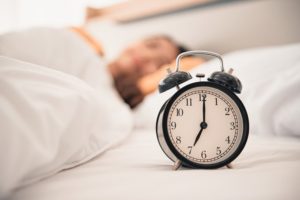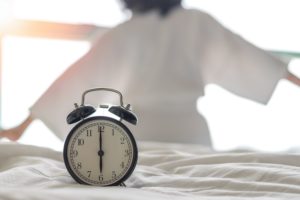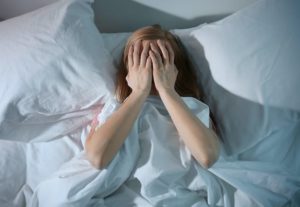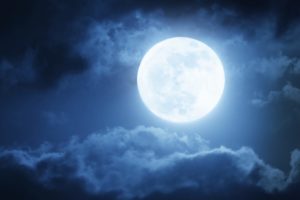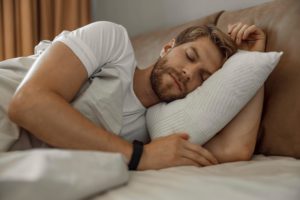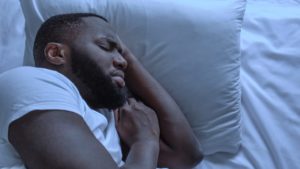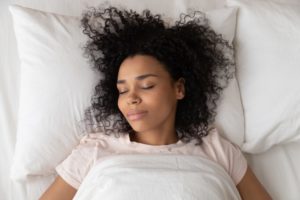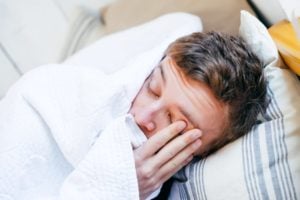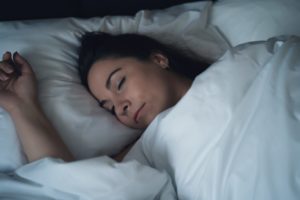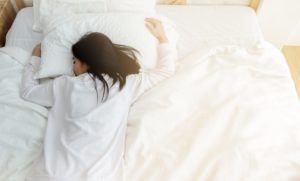When you buy through our links, we may earn a commission. Products or services may be offered by an affiliated entity. Learn more.
How Memory and Sleep Are Connected
Scientists and researchers have studied the relationship between memory and sleep for more than 100 years. The general consensus today is that memory consolidation – the process of preserving key memories and discarding excessive information – takes place during both the non-rapid eye movement (NREM) and rapid eye movement (REM) stages of your sleep cycle.
Recent studies also suggest that insufficient and excessive sleep can affect memory processing and other cognitive processes. A good night’s rest not only promotes good physical health but also enables our brains to function properly, so getting the recommended amount of sleep each night is key to consolidating memories.
Sleep’s Role in Memory Consolidation
Sleep and memory share a complex relationship. Getting enough rest helps you process new information once you wake up, and sleeping after learning can consolidate this information into memories, allowing you to store them in your brain.
A healthy adult’s sleep cycle consists of four distinct stages. The first two stages are considered light NREM sleep, and the third is deep (or “slow-wave”) NREM sleep. These three stages prepare your brain to learn new information the following day. Not sleeping or getting enough sleep can lower your learning abilities by as much as 40%.
During these NREM stages, the brain also sorts through your various memories from the previous day, filtering out important memories and eliminating other information. These selected memories will become more concrete as deep NREM sleep begins, and this process will continue during REM sleep. Emotional memories are also processed in the REM stage, which can help you cope with difficult experiences.
Most dreaming occurs in REM sleep. The thalamus of the brain transmits cues from your five senses to the cerebral cortex, a thin layer of the cerebrum that interprets and processes information from your memories. The thalamus is largely inactive during NREM stages, but when REM sleep begins, it will relay images, sounds, and other sensations to the cerebral cortex that are then integrated into your dreams.
Looking to improve your sleep? Try upgrading your mattress.
How Does Sleep Deprivation Affect Brain Function and Memory?
People who don’t get enough sleep may experience the effects of sleep deprivation. Difficulty remembering things is one common symptom. Since the brain does not have sufficient time to create new pathways for the information you’ve recently learned, sleep deprivation often affects how memories are consolidated. Other potential cognitive impacts include trouble learning and focusing, reduced decision-making skills, and poor emotional and behavioral control.
How much sleep you should get each night largely depends on your age. In addition to adults, studies have concluded children experience stronger memory consolidation after a good night’s sleep. That said, excessive sleep can also lead to cognitive impairments. Every person should strive for the optimal amount of nightly sleep, as too little or too much can have negative repercussions.
Our recommendations for nightly sleep based on age are as follows:
| Age Group | Age Range | Recommended Amount of Sleep per Day |
|---|---|---|
| Infant | 4-12 months | 12-16 hours |
| Toddler | 1-2 years | 11-14 hours |
| Preschool | 3-5 years | 10-13 hours |
| School-age | 6-12 years | 9-12 hours |
| Teen | 13-18 years | 8-10 hours |
| Adult | 18 years and older | 7 hours or more |
Some studies have found sleep quality decreases with age. This is tied to slow-wave sleep. Slow waves are produced in an area of the brain known as the medial prefrontal cortex. The medial prefrontal cortex will deteriorate over time, and as a result, older people typically experience less slow-wave sleep during a normal sleep cycle and have a harder time processing memories.
Sleep Apnea and Memory Loss
Since sleep is so crucial to the formation and consolidation of memories, some sleep disorders are associated with memory problems. Insomnia, defined as persistent difficulty initiating or maintaining sleep, is known to cause daytime cognitive impairments including reduced memory functioning. Sleep disorders that lead to excessive daytime sleepiness such as narcolepsy can cause memory lapses.
One disorder, sleep apnea, may actually promote memory loss. Sleep apnea is characterized by the temporary cessation of the airway during sleep that can cause people to choke or gasp for air. Heavy snoring and excessive daytime sleepiness are other common symptoms of sleep apnea.
More than 900 million people across the globe live with obstructive sleep apnea (OSA), a subtype of the disorder that occurs when a physical blockage impedes the airway. OSA has long been linked to chronic depression. People with depression often have a difficult time processing memories, specifically autobiographical memories that pertain to their own experiences. People with OSA have also demonstrated difficulty with memory consolidation.
One study sought to explore the relationship between OSA and depression in terms of memory processing. The findings show subjects with OSA struggled more to form semantic memories, or individual facts from their personal history, than the control group. This is not surprising since healthy sleep is needed to properly consolidate semantic memories, and OSA causes sleep fragmentation that interferes with the sleep cycle. Interestingly, OSA did not affect the consolidation of episodic memories – or those related to events and experiences – to the same extent.
These results suggest sleep apnea can interfere with the memory consolidation process, causing people to have a hard time recalling certain memories of their own life. However, more research is needed to explore whether OSA leads to both depression and memory problems, or if OSA and depression independently affect memory consolidation.

Still have questions? Ask our community!
Join our Sleep Care Community — a trusted hub of product specialists, sleep health professionals, and people just like you. Whether you’re searching for the perfect mattress or need expert sleep advice, we’ve got you covered. Get personalized guidance from the experts who know sleep best.
References
9 Sources
-
Ma, Y., Liang, L., Zheng, F., Shi, L., Zhong, B., & Xie, W. (2020). Association Between Sleep Duration and Cognitive Decline. JAMA network open, 3(9), e2013573.
https://pubmed.ncbi.nlm.nih.gov/32955572/ -
National Institutes of Health. (2019, September 19). The brain may actively forget during dream sleep [Press release].
https://www.nih.gov/news-events/news-releases/brain-may-actively-forget-during-dream-sleep -
NIH News in Health. Sleep On It. How Snoozing Strengthens Memories. (April 2013).
https://newsinhealth.nih.gov/2013/04/sleep-it -
National Heart, Lung, and Blood Institute. (n.d.). Sleep deprivation and deficiency.
https://www.nhlbi.nih.gov/health-topics/sleep-deprivation-and-deficiency -
Peiffer, A., Brichet, M., De Tiège, X. et al. The power of children’s sleep – Improved declarative memory consolidation in children compared with adults. Sci Rep 10, 9979 (2020).
https://pubmed.ncbi.nlm.nih.gov/32561803/ -
Mander, B., Rao, V., Lu, B. et al. Prefrontal atrophy, disrupted NREM slow waves and impaired hippocampal-dependent memory in aging. Nat Neurosci 16, 357–364 (2013).
https://pubmed.ncbi.nlm.nih.gov/23354332/ -
American Academy of Sleep Medicine. (2014). The International Classification of Sleep Disorders – Third Edition (ICSD-3). Darien, IL.
https://aasm.org/ -
Science Daily. (2019, January 31). Sleep apnea creates gaps in life memories [Press release].
https://www.sciencedaily.com/releases/2019/01/190131101103.htm -
Delhikar, N., Sommers, L., Rayner, G., Schembri, R., Robinson, S., Wilson, S., & Jackson, M. (2019). Autobiographical Memory From Different Life Stages in Individuals With Obstructive Sleep Apnea. Journal of the International Neuropsychological Society, 25(3), 266-274.
https://www.cambridge.org/core/product/identifier/S1355617718001091/type/journal_article



